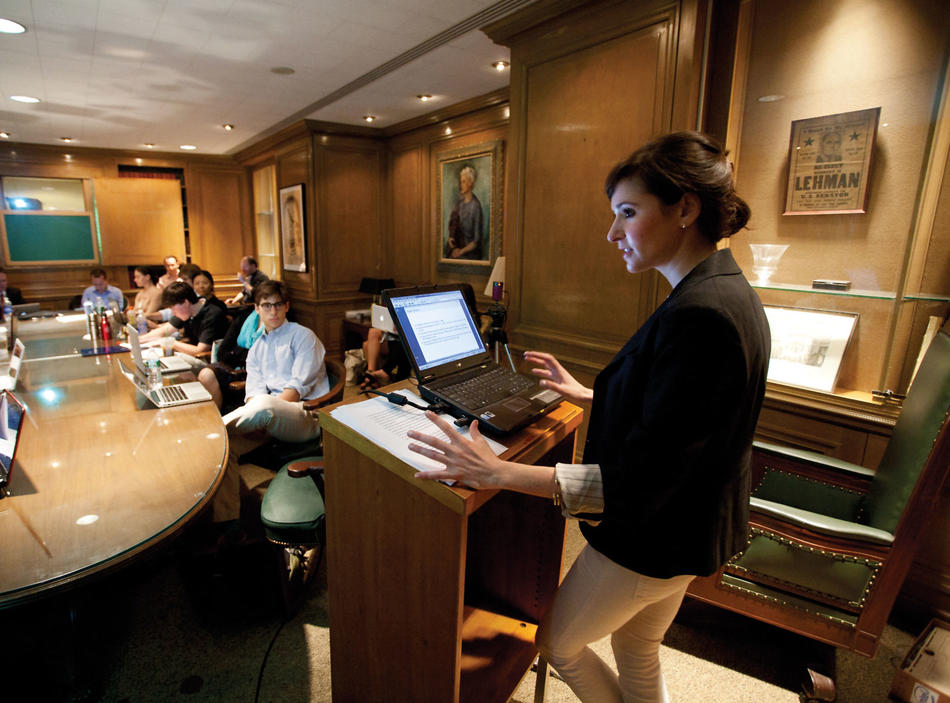Will Leonard ’12CC was searching for a senior thesis topic this spring when he stumbled upon a curious aspect of Jimmy Carter’s presidency. He wondered why Carter, who took office with the intention of reducing the world’s stockpile of nuclear weapons, ended up deploying 572 new missiles to Western Europe. Historians generally believe that Carter’s foreign-policy team feared that war with the Soviet Union could be imminent, but Leonard saw little evidence to support this idea.
So in July, Leonard and a research companion from Yale flew to the Carter Presidential Library in Atlanta to examine transcripts of meetings between Carter’s foreign-policy team and European leaders. Leonard telephoned Zbigniew Brzezinski, Carter’s national security adviser. And he traveled to Arlington, Virginia, to interview David Aaron, Brzezinski’s deputy. What he learned contradicted the historical record: Brzezinski and Aaron had never seriously feared a nuclear threat from the Soviet Union during this period. They told Leonard that the United States deployed the missiles primarily to placate European allies and to gain leverage in any nuclear-weapons negotiations.
This type of original research is the cornerstone of the new Hertog Global Strategy Initiative, an intensive 12-week summer program underwritten by businessman and philanthropist Roger Hertog. The program, founded and directed by Columbia history professor Matthew Connelly, encourages aspiring historians to study topics relevant to contemporary world affairs, while pushing young political scientists and public-policy students to conduct historical research. It is administered by the history department.
The program brings undergraduates, master’s degree students, and doctoral candidates from all of these fields together in an environment that Connelly likens to a “research laboratory.” Students travel, sometimes in groups, to visit archives and interview important figures. Then they share their most interesting documents and interviews with one another in an electronic archive.
“I wanted to create a research program that deals with a specific issue in world politics that’s too big and complex for a single scholar to handle,” says Connelly, whose latest book, Fatal Misconception, chronicles the global population-control movements of the 20th century. “Every year we’re going to tackle a different issue.”
This summer, the topic was nuclear proliferation. The program began with a three-week course on nuclear strategy and methods of historical analysis, followed by eight weeks of original research. Prominent policymakers and scholars addressed the seminar weekly. They included former secretary of state Henry Kissinger, former chief UN weapons inspector Hans Blix, and Yale historian John Lewis Gaddis.
The core seminar was taught by Connelly and University of Texas international-affairs professor Francis J. Gavin. About one-third of the student participants were from Columbia; the others came from universities across the U.S.
Now, several of the students are collaborating with Connelly and Gavin on a research article about the use of forecasting and scenario planning in formulating nuclear strategy. Leonard’s summer project will likely form the basis of his senior history thesis.
Topics for future programs may involve climate change, financial crises, migration, and pandemics. “The common thread is that we’ll use history to think about, and prepare for, the future,” says Connelly, who is looking for additional funding to keep the program going after Hertog’s gift runs out after its second year, as well as to support students who are continuing their research into the academic year.
“This program is about liberating scholars,” says Connelly, “so that undergraduates are doing advanced research like graduate students, graduate students are thinking boldly and creatively like undergraduates, political scientists are thinking like historians, and historians like political scientists. That’s what we’re trying to do. It’s exciting, and it’s also risky. But I think it will pay off.”



